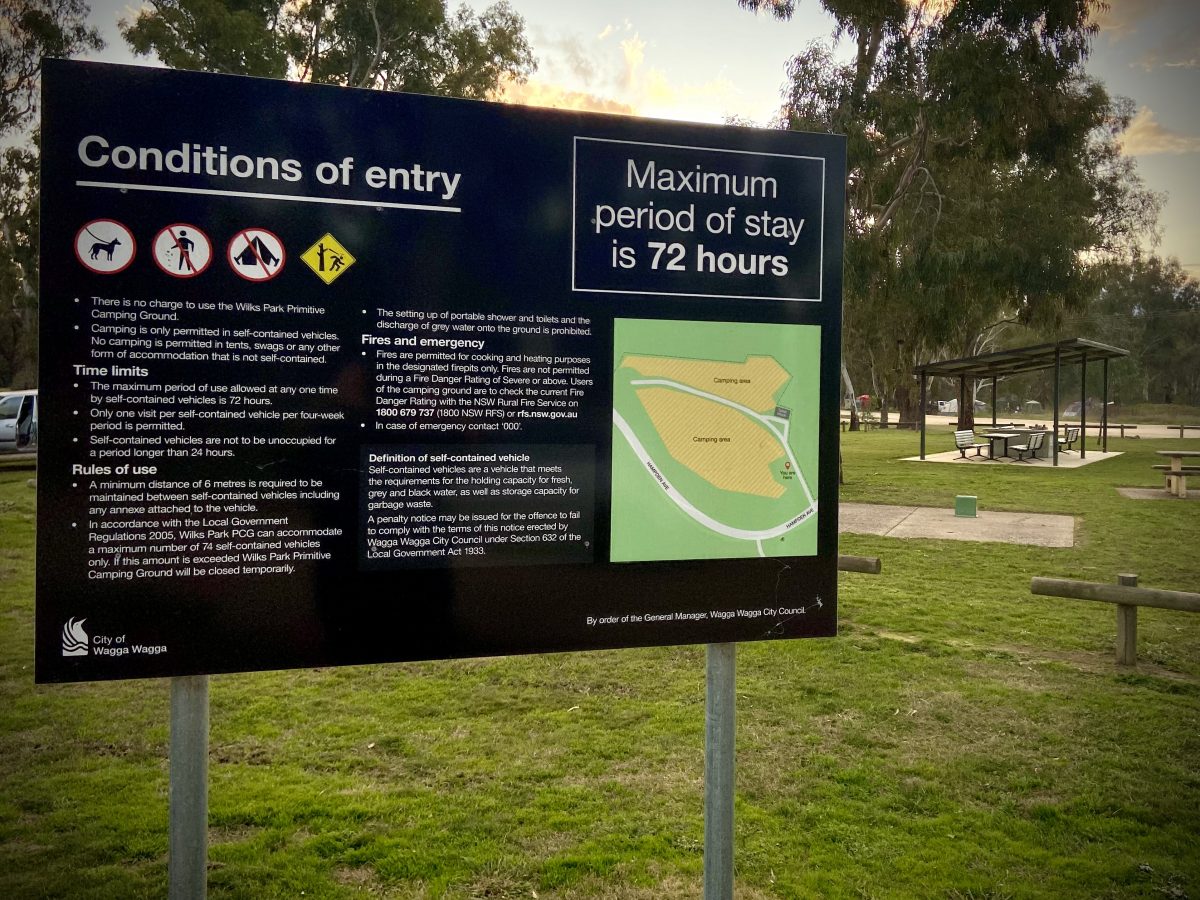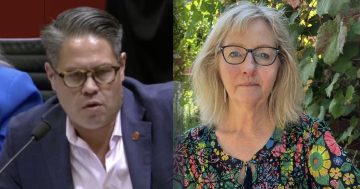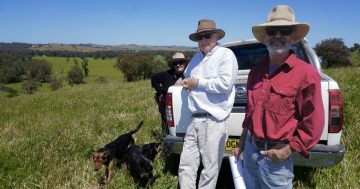
A newly installed sign at the entrance to Wilks Park outlines the conditions of entry. Photo: Chris Roe.
A war of words has erupted between Wagga City Council and the State Government over how the Wilks Park homelessness situation should have been handled.
Last week, the council issued notices to long-term campers staying in the Wilks Park primitive campground, requiring them to move on before Thursday 28 July.
This resulted in widespread public outcry – a Change.org petition garnered more than 1200 signatures and many supporters criticising the council for not providing support.
The council maintains that the Department of Communities and Justice (DCJ) is responsible for finding alternative accommodation.
They said that the notices were only distributed after extensive consultation with the residents of Wilks Park and the NSW Government.
“If I sound a bit annoyed, it’s because I am a bit annoyed,” Council General Manager Peter Thompson said as he fronted the media on Tuesday.
“It’s important to remember that we’re not the frontline agency that should be delivering care to those people that are in need; we’re the land managers.”
He said Wagga City Council does not intend to actively remove people from the park.
“We definitely won’t be enabling their (DCJ’s) behaviour after this; we will simply not enforce the notices – but this is not the outcome we want,” he said.
“These people deserve a whole-of-government response to this issue and they’re not getting it.”
But a State Government spokesman has hit back with Wagga-based MLC Wes Fang describing the council’s approach as “disappointing”.
“I think the blunt force of an eviction notice that was the method used by council was more bureaucratic and coldhearted than it needed to be,” he said.
“To try and somehow say that they were just doing their job in managing the land is correct from a bureaucratic standpoint, but ignores the social and the community aspects of the response and the responsibility.”
Wagga councillors met on Monday night to discuss the issue.
According to Mr Thompson, DCJ “retreated from consultation” and the council found itself “in a vacuum” with no information.
He said that DCJ representatives failed to attend this meeting, and expressed his frustration that collaboration between local council and state authorities was not acknowledged.
Mr Thompson said they had a clear understanding that the State Government did have services and programs available, which they would roll out to the people who had no alternative accommodations.
“We’re at a loss as to why the State Government has closed those discussions and is not engaging with us at all – it’s something that we’re not aware of,” he explained.
“We will reach out again and ask them to engage with us and discuss this problem. If that’s not forthcoming, then that will inform our decision about whether we take any further action in relation to those notices.”
Mr Fang said DCJ was blindsided by both the eviction notices and yesterday’s council media conference.
“They seem to have been seeking to shift blame without actually addressing the issue,” he said.
“The Monday evening workshop that was held by council was nothing more than a propaganda planning exercise.
“From what I can tell they have failed to promulgate any plans for the Wilks Park issue, other than to coordinate their statements blaming the State Government and DCJ, which has been done in unison without actually addressing the issue at hand.”
Where they do agree is that something needs to be done.
Residents in Wilks Park confirmed that they had spoken to representatives from DCJ but had only been offered a short-term solution or a place on the waiting list for Social Housing.
“Not everybody wants to accept that solution. That’s their right and we can’t force people to accept that accommodation,” Mr Fang said.
“But we have offered it, we have been on the ground, which is more than I can say for what council has done, which seems to be creating a PR war to justify the decisions that they’ve made.”
Mr Thompson said it was naive of the council to assume the State Government would deliver on their promises.
“People sleeping in a floodway underneath a tarp should not be the standard that the NSW Government is aspiring to,” he said.
He reiterated that the NSW Government has “all of the resources, they have all of the specialist staff and all of the funding.”
“Wagga Council does not have any of those resources or the statutory role to provide those solutions,” he said.
Mr Fang said the government would not avoid its responsibilities but acknowledged that the situation was complex and resources were stretched after two years of fires, floods and a global pandemic.
“I think that the response from council seems to be an assumption that they would just issue these notices and DCJ would just find them all houses,” he said.
“I can’t stand here and say that we will have a solution to every one of the problems. But it’s incumbent on us to keep working and trying as best as we can to make sure that what we can do in the space is done.”
















